- Home
- Hilary Mantel
Beyond Black Page 9
Beyond Black Read online
Page 9
“No, it was my uncle that died.” The client paused. “He died in November. My dad died about—I don’t know, ages ago—” She put her hand to her mouth. “Oh,” she said. “Run it past me again, will you?” Grant her this: she wasn’t slow on the uptake.
“Let’s just see if we can unknot this,” Al said. “You say these are your father’s cuff links. I say, no, though they may have belonged to the man you called your father. You say your uncle passed last November, and your father passed years ago. But I say, your uncle has been a long time in Spirit, but your dad passed in the autumn. Now, are you with me?”
The client nodded.
“You’re sure you’re with me? I mean, I don’t want you to think I’m slandering your mum. But these things happen, in families. Now your uncle’s name is—?”
“Mike.”
“Mike, and your dad’s—Terry, right? So you think. But the way I see it, Terry’s your uncle and Uncle Mike’s your dad.”
Silence. The woman shifted in her chair. “He was always hanging about, Mike, when I was little. Always round the house.”
“Chez vous,” Al said. “Well, he would be.”
“It explains a lot. My flat hair, for one thing.”
“Yes, doesn’t it?” Alison said. “When you finally get it sorted out, who’s who in your family, it does explain a lot.” She sighed. “It’s a shame your mum’s passed, so you can’t ask her what was what. Or why. Or anything like that.”
“She wouldn’t have told me. Can’t you tell me?”
“My guess is, Terry was a quiet type, whereas Uncle Mike, he was a bit of a boyo. Which was what your mum liked. Impulsive, that’s how I’d describe her, if I was pushed. You too, maybe. But only in—not in your general affairs but only in what we call—er—matters of partnership.”
“What does that mean?”
“It means that when you see a bloke you like you go straight after him.” Like a whippet after a hare, she thought. “You say to yourself, no, I must do strategy, play it cool, but you don’t heed your own advice, you’re very much—how shall I say it?—bed on the first date. Well, why not? I mean, life’s too short.”
“I can’t do this. I’m sorry.” The client half rose.
Alison put her hand out. “It’s the shock. About your dad. It takes a bit of getting used to. I wouldn’t have broken it to you like that if I didn’t think you could take it. And straight talking—I think you can take that too.”
“I can take it,” Colette said. She sat down again.
“You’re proud,” Al said softly. “You won’t be bested.”
“That describes me.”
“If Jack and Jill can do it, you can do it.”
“That’s true.”
“You don’t suffer fools gladly.”
“I don’t.”
It was an old Mrs. Etchells line; she was probably using it right now, three tables down: “You don’t suffer fools gladly, dear!” As if the client were going to come back at you “Fools! I love ’em! Can’t get enough! I go out round the streets, me, looking for fools to ask them home to dinner!”
Alison sat back in her chair. “The way I see you now, you’re dissatisfied, restless.”
“Yes.”
“You’ve reached a place in your life where you don’t much want to be.”
“Yes.”
“You’re ready and willing to move on.”
“Yes.”
“So do you want to come and work for me?”
“What?”
“Can you type, drive, anything like that? I need a sort of, what do they call it? Girl Friday.”
“This is a bit sudden.”
“Not really. I felt I knew you when I saw you from the platform last night.”
“The platform?”
“The platform is what we call any kind of stage.”
“Why?”
“I don’t know. It’s historical, I suppose.”
Colette leaned forward. She locked her fists together between her knees. Alison said, “If you come into the front bar in about an hour, we can get a coffee.”
Colette cast a glance at the long queue behind her.
“Okay, say an hour and a quarter?”
“What do you do, put up a CLOSED sign?”
“No, I just put them on divert, I say, go see Mrs. Etchells three tables down.”
“Why? Is she good?”
“Mrs. Etchells? Entre nous, she’s rubbish. But she taught me. I owe her.”
“You’re loyal?”
“I hope so.”
“Is that her? Wrinkly old bag with a charm bracelet on? Now I’ll tell you something. She’s not loyal to you.”
She spelled it out: “She tried to poach me, tried to catch me as I was looking about for you: cards, crystal, and psychometry thrown in, thirty quid.”
Alison blushed, a deep crimson blush. “She said that? Thirty quid?”
“Fancy you not knowing.”
“My mind was somewhere else.” She laughed shakily. “Voilà. You’ve already earned your money, Colette.”
“You know my name?”
“It’s that certain something French about you. Je ne sais quoi.”
“You speak French?”
“Never till today.”
“You mustn’t mind-read me.”
“I would try not to.”
“An hour and a quarter?”
“You could get some fresh air.”
On Windsor Bridge, a young boy was sitting on a bench with his Rottweiler at his feet. He was eating an ice-cream cone and holding another out to the dog. Passersby, smiling, were collecting to watch. The dog ate with civil, swirling motions of his tongue. Then he crunched the last of his cornet, swarmed up onto the bench and laid his head lovingly on the boy’s shoulder. The boy fed him the last of his own ice cream, and the crowd laughed. The dog, encouraged, licked and nibbled the boy’s ears, and the crowd went ohh, feech, yuk, how sweet!
The dog jumped down from the bench. Its eyes were steady and its paws huge. For two pins, or the dog equivalent, it would set itself to eat the crowd, worrying each nape and tossing the children like pancakes.
Colette stood and watched until the crowd had dispersed and she was alone. She crossed the bridge and edged down Eton High Street, impeded by tourists. I am like the dog, she thought. I have an appetite. Is that wrong? My mum had an appetite. I realize it now, how she talked in code all those years. No wonder I never knew what was what and who was who. Nor surprising her aunts were always exchanging glances, saying things like I wonder where Colette gets her hair from, I wonder where she gets her brains? The man she’d called her father was distinguished by the sort of stupidity that made him squalid. She had a mental picture of him, sprawled before the television scratching his belly. Perhaps, when she’d bought him the cuff links, she’d been hoping to improve him. Her Uncle Mike, on the other hand—who was really her father—was a man whose wallet was always stuffed. Hadn’t he been round every week flashing his fivers and saying, here, Angie, get something nice for little Colette? He’d paid, but he hadn’t paid enough; he’d paid as an uncle, but not as a dad. I’ll sue the bastard, she thought. Then she remembered he was dead.
She went into the Crown and Cushion and got a pineapple juice, which she took into a corner. Every few minutes she checked her watch. Too early, she started back across the bridge.
Alison was sitting in the front room of the Harte and Garter with a cafetière and two cups. She had her back to the door, and Colette paused for a moment, getting a view of her: she’s huge, she thought, how can she go around like that? As she watched, Alison’s plump smooth arm reached for the coffee and poured it into the second cup.
Colette sat down. She crossed her legs. She fixed Alison with a cool stare. “You don’t mind what you say, do you? You could have really upset me, back there.”
“There was a risk.” Alison smiled.
“You think you’re a good judge of character.”
&nb
sp; “More often than not.”
“And my mum. I mean, for all you know, I could have burst into tears. I could have collapsed.”
Not a real risk, Al thought. At some level, in some recess of themselves, people know what they know. But the client was determined to have her moment.
“Because what you were saying, really, is that she was having an affair with my uncle under my dad’s nose. Which isn’t nice, is it? And she let my dad think I was his.”
“I wouldn’t call it an affair. It was more of a fling.”
“So what does that make her? A slag.”
Alison put down her coffee cup. “They say don’t speak ill of the dead.” She laughed. “But why not? They speak ill of you.”
“Do they?” Colette thought of Renee. “What are they saying?”
“A joke. I was making a joke. I see you think I shouldn’t.”
She took from Colette the thimble-sized serving of milk she was fumbling with, flicked up the foil with her nail, and tipped the milk into Colette’s coffee.
“Black. I take it black.”
“Sorry.”
“Another thing you didn’t know.”
“Another.”
“This job you were talking about—” Colette broke off. She narrowed her eyes and looked speculatively at Al, as if she were a long way off.
Al said, “Don’t frown. You’ll stay like that one day. Just ask me what you need to ask.”
“Don’t you know?”
“You asked me not to read your mind.”
“You’re right. I did. Fair’s fair. But can you shut it off like that? Shut it off and then just turn it on when you want it?”
“It’s not like that. I don’t know how I can explain. It’s not like a tap.”
“Is it like a switch?”
“Not like a switch.”
“It’s like—I suppose—is it like somebody whispering to you?”
“Yes. More like that. But not exactly whispering. I mean, not in your ear.”
“Not in your ear.” Colette stirred her coffee round and round.
Al picked up a paper straw of brown sugar, pinched off the end, and dropped it into Colette’s cup. “You need the energy,” she explained. Colette, frowning, continued to stir.
“I have to get back soon,” Al said. “They’re building up in there.”
“So if it’s not a switch—”
“About the job. You could sleep on it.”
“And it’s not a tap—”
“You could ring me tomorrow.”
“And it’s not somebody whispering in your ear—”
“My number’s on the leaflet. Have you got my leaflet?”
“Does your spirit guide tell you things?”
“Don’t leave it too long.”
“You said he was called Morris. A little bouncing circus clown.”
“Yes.”
“Sounds a pain.”
“He can be.”
“Does he live with you? In your house? I mean, if you call it ‘live’?”
“You might as well,” Al said. She sounded tired. “You might as well call it ‘live’ as call it anything.” She pushed herself to her feet. “It’s going to be a long afternoon.”
“Where do you live?”
“Wexham.”
“Is that far?”
“Just up into Bucks.”
“How do you get home, do you drive?”
“Train and then a taxi.”
“By the way, I think you must be right. About my family.”
Al looked down at her. “I sense you’re wavering. I mean, about my offer. It’s not like you to be indecisive. More like you to take the plunge.”
“I’m not quite sure what you’d want me to do. I’m used to job description.”
“We could work one up. If that’s what’s worrying you. Write your own, why not? You’ll soon see what needs to be done.” Alison was rummaging for something in her bag. “I may not be able to pay as much as your last job. But then, when you’ve looked at my books, you’ll be able to tell me what I can afford. And also, it’s a quality-of-life thing, isn’t it? I should think the schedule will be more relaxed than in your last job. You’d have more leisure.” Then she said, as if she were embarrassed, “You wouldn’t get rich out of me. I’m no good for lottery numbers or anything like that.”
“Can you hang on for a minute?” Colette said. “I need to know more.”
“They’ll be waiting.”
“Make them wait.”
“Yes, but not too long. Or Mrs. Etchells will catch them.” Al had found a tube of mints in her bag. She proffered it to Colette. “Keeps the mind alert,” she said. “What I need, you see, is someone to keep the diary straight and make sure I don’t double-book. Liaise with the management, wherever I’m on the platform. Book hotels. Do the accounts. It would be good to have someone to answer the phone. If I’m with a client, I can’t always break off.”
“You don’t have an answering machine?”
“The clients would rather hear a human voice. Anyway, I’m not very good with electrical things.”
“So how do you do your washing? In a tub?”
“No, the fact is—” Alison looked down. She looked harried. “I can see there’s a lot I’m going to have to explain to you,” she said.
The truth was, it emerged, that whatever message Alison left on her machine was liable to become corrupted. Other messages, quite different ones, would overlay it. Where did they come from? “There’s no simple answer to that,” Alison said. She checked her watch. “I meant to eat but I’ve been talking.”
“I’ll bring you a sandwich in, shall I?”
“I never eat when I’m reading. It’s not professional. Oh, well. Do me no harm to be hungry, will it? I’ll hardly waste away.” She patted her tummy, smiled miserably. “Look, about the travelling, I do travel a lot, and I used to drive, but I don’t anymore. I think if I had a friend with me, I could manage, so we could split it, you see.”
“You need a navigator?”
“It’s not so much that.” What Alison needed, she explained—picking again at the sugar straws, opening them and putting them down—was a warm living body beside her, as she drove from town to town, fayre to fayre, and from one Psychic Extravaganza to another. Otherwise, a spirit would come and sit in the passenger seat, and natter on while she tried to negotiate an unfamiliar one-way system. “Do you know Bracknell? Bracknell’s hell. All those roundabouts.”
“What’s to stop the spirits from climbing in the back seat instead? Or have you got a two-door?”
Alison looked at her for a long moment. Colette thought she was actually going to answer the question. “Look, Colette,” she said softly. She had got four straws lined up now, and she moved them about, delicately, with one finger: changing the pattern, shuffling and reshuffling. “Look, it doesn’t matter if you’re a bit sceptical. I understand. I’d be sceptical myself. All you need to realize is that it doesn’t matter what you think, it doesn’t matter what I think—what happens, happens all the same. The only thing is, I don’t do tests, I don’t do tricks for people to try to prove myself, because I don’t need to prove anything. Do you see?”
Colette nodded.
Alison raised a finger to a girl who was serving and pointed to the cafetière. “A refill for you,” she explained. “I can see you’re bitter. Why shouldn’t you be? Life hasn’t treated you well. You’ve worked hard and had no reward. You’ve lost your home. And you’ve lost a lot of your money, haven’t you?”
Colette’s eyes followed the trail of brown sugar curling across the table; like an initial, trying to form itself. “You seem to know a lot about me.”
“I laid out a spread for you. After you’d gone.”
“A spread?”
“The tarot cards.”
“I know. Which spread?”
“Basic Romany.”
“Why that?”
“I was in a hurry.”
“And what did you see?”
“I saw myself.”
Al got up and headed back towards the main hall, handing a ten-pound note to a girl as she passed, pointing to the table she had just left. That’s far too much, Colette thought, two pots of coffee, ten pounds, what is she thinking? She felt a flare of indignation, as if it were her own cash that had been spent. She drank all the coffee, so as not to be wasteful, tipping the pot so its muddy grounds shifted. She went to the LADIES, and as she washed her hands she watched herself in the mirror. Maybe no mind-reading in it, she thought. No psychic tricks needed, or information from spirit guides. She did look like a woman who had lost her money: lost her lottery ticket in life, lost her dad and lost her home.
That summer they laughed a lot. They acted as if they were in love, planning for each other treats and nice things to eat and surprising each other with thoughtful gifts. Alison gave Colette a voucher for a day spa in Windsor; I won’t come, she said cheerfully, I don’t want some foul-breathed anorexic lecturing me about my cellulite, but you enjoy yourself, Colette. Colette dropped into Caleys and bought a warm throw, soft mohair and the colour of crushed raspberries; lovely, Al said that evening, just what I need, something to cover me up.
Colette took over most of the driving, finding that she didn’t mind at all. “Change the car,” she said to Alison, and they went out to a showroom that very afternoon. They picked one because they liked the colour and the up-holstery; she imagined herself, putting two fingers up to Gavin, and when the salesman tried to talk car sense they just giggled at each other. “The truth is, they’re all the same these days,” she said loudly. “I don’t know much, but I do know that.”
Al wasn’t interested, she just wanted it done with; but when the salesman tried to trap her into a finance deal, she slapped him down smartly. She agreed on a delivery date, wrote a cheque; Colette was impressed by her style. When they got home she rummaged through Al’s wardrobe and threw out the worst bits of Lurex. She tried to smuggle the “silk” out, in a black bin liner, but Al went after the plastic bag and retrieved it, drawing it out and looping it around her arm. “Nice try,” she said to Colette. “But I’m sticking with it, please.”

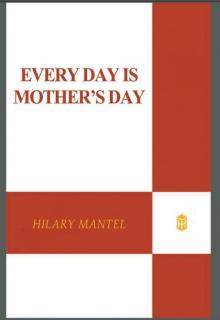 Every Day Is Mother's Day
Every Day Is Mother's Day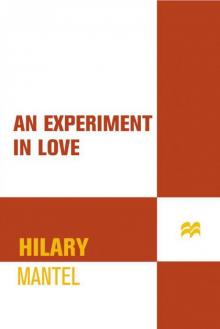 An Experiment in Love
An Experiment in Love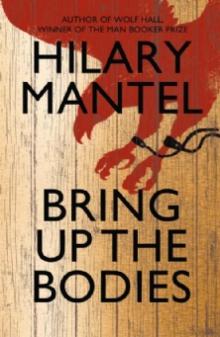 Wolf Hall
Wolf Hall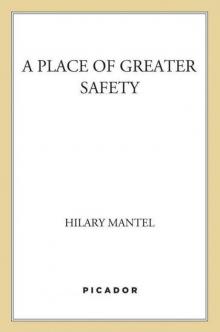 A Place of Greater Safety
A Place of Greater Safety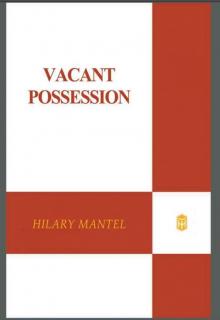 Vacant Possession
Vacant Possession The Giant, O'Brien
The Giant, O'Brien Beyond Black
Beyond Black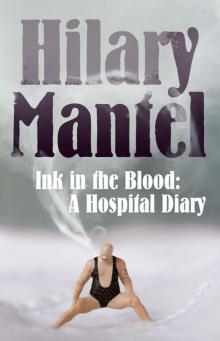 Ink in the Blood: A Hospital Diary
Ink in the Blood: A Hospital Diary The School of English
The School of English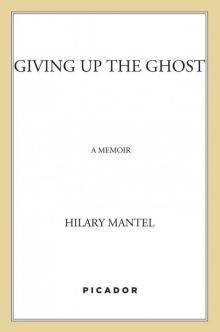 Giving Up the Ghost
Giving Up the Ghost The Mirror and the Light: 2020’s highly anticipated conclusion to the best selling, award winning Wolf Hall series (The Wolf Hall Trilogy, Book 3)
The Mirror and the Light: 2020’s highly anticipated conclusion to the best selling, award winning Wolf Hall series (The Wolf Hall Trilogy, Book 3) Fludd
Fludd Eight Months on Ghazzah Street
Eight Months on Ghazzah Street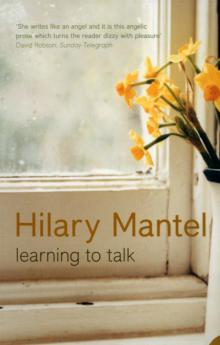 Learning to Talk
Learning to Talk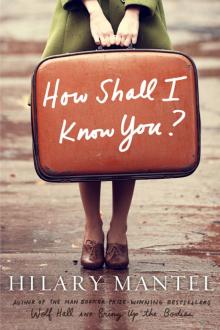 How Shall I Know You?: A Short Story
How Shall I Know You?: A Short Story A Change of Climate
A Change of Climate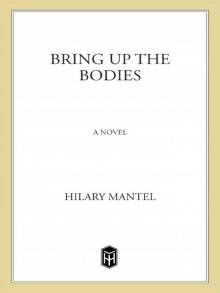 Bring Up the Bodies
Bring Up the Bodies The Assassination of Margaret Thatcher: Stories
The Assassination of Margaret Thatcher: Stories Beyond Black: A Novel
Beyond Black: A Novel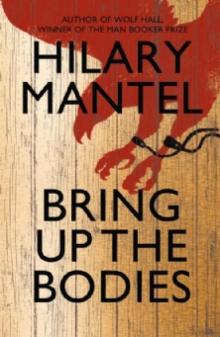 Wolf Hall: Bring Up the Bodies
Wolf Hall: Bring Up the Bodies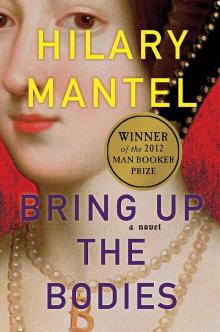 Bring Up the Bodies tct-2
Bring Up the Bodies tct-2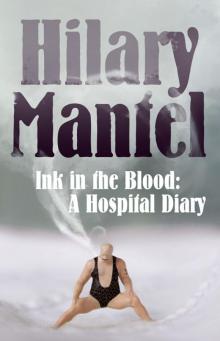 Ink in the Blood
Ink in the Blood The Assassination of Margaret Thatcher
The Assassination of Margaret Thatcher Eight Months on Ghazzah Street: A Novel
Eight Months on Ghazzah Street: A Novel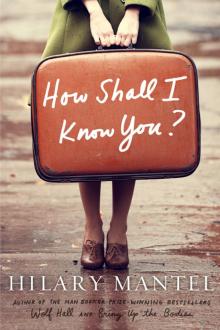 How Shall I Know You?
How Shall I Know You? A Change of Climate: A Novel
A Change of Climate: A Novel The Giant, O'Brien: A Novel
The Giant, O'Brien: A Novel Fludd: A Novel
Fludd: A Novel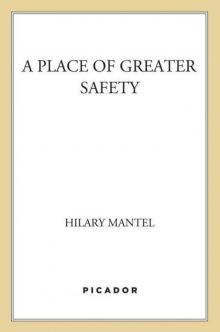 A Place of Greater Safety: A Novel
A Place of Greater Safety: A Novel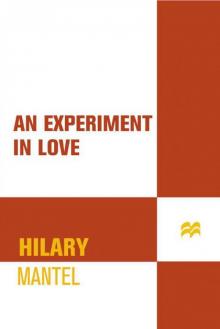 An Experiment in Love: A Novel
An Experiment in Love: A Novel